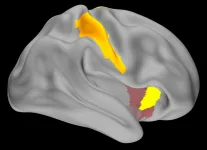Study shows how taking short breaks may help our brains learn new skills
NIH scientists discover that the resting brain repeatedly replays compressed memories of what was just practiced
2021-06-08
(Press-News.org) In a study of healthy volunteers, National Institutes of Health researchers have mapped out the brain activity that flows when we learn a new skill, such as playing a new song on the piano, and discovered why taking short breaks from practice is a key to learning. The researchers found that during rest the volunteers' brains rapidly and repeatedly replayed faster versions of the activity seen while they practiced typing a code. The more a volunteer replayed the activity the better they performed during subsequent practice sessions, suggesting rest strengthened memories.
"Our results support the idea that wakeful rest plays just as important a role as practice in learning a new skill. It appears to be the period when our brains compress and consolidate memories of what we just practiced," said Leonardo G. Cohen, M.D., senior investigator at the NIH's National Institute of Neurological Disorders and Stroke (NINDS) and the senior author of the study published in Cell Reports. "Understanding this role of neural replay may not only help shape how we learn new skills but also how we help patients recover skills lost after neurological injury like stroke."
The study was conducted at the NIH Clinical Center. Dr. Cohen's team used a highly sensitive scanning technique, called magnetoencephalography, to record the brain waves of 33 healthy, right-handed volunteers as they learned to type a five-digit test code with their left hands. The subjects sat in a chair and under the scanner's long, cone-shaped cap. An experiment began when a subject was shown the code "41234" on a screen and asked to type it out as many times as possible for 10 seconds and then take a 10 second break. Subjects were asked to repeat this cycle of alternating practice and rest sessions a total of 35 times.
During the first few trials, the speed at which subjects correctly typed the code improved dramatically and then leveled off around the 11th cycle. In a previous study, led by former NIH postdoctoral fellow Marlene Bönstrup, M.D., Dr. Cohen's team showed that most of these gains happened during short rests, and not when the subjects were typing. Moreover, the gains were greater than those made after a night's sleep and were correlated with a decrease in the size of brain waves, called beta rhythms. In this new report, the researchers searched for something different in the subjects' brain waves.
"We wanted to explore the mechanisms behind memory strengthening seen during wakeful rest. Several forms of memory appear to rely on the replaying of neural activity, so we decided to test this idea out for procedural skill learning," said Ethan R. Buch, Ph.D., a staff scientist on Dr. Cohen's team and leader of the study.
To do this, Leonardo Claudino, Ph.D., a former postdoctoral fellow in Dr. Cohen's lab, helped Dr. Buch develop a computer program which allowed the team to decipher the brain wave activity associated with typing each number in the test code.
The program helped them discover that a much faster version - about 20 times faster - of the brain activity seen during typing was replayed during the rest periods. Over the course of the first eleven practice trials, these compressed versions of the activity were replayed many times - about 25 times - per rest period. This was two to three times more often than the activity seen during later rest periods or after the experiments had ended.
Interestingly, they found that the frequency of replay during rest predicted memory strengthening. In other words, the subjects whose brains replayed the typing activity more often showed greater jumps in performance after each trial than those who replayed it less often.
"During the early part of the learning curve we saw that wakeful rest replay was compressed in time, frequent, and a good predictor of variability in learning a new skill across individuals," said Dr. Buch. "This suggests that during wakeful rest the brain binds together the memories required to learn a new skill."
As expected, the team discovered that the replay activity often happened in the sensorimotor regions of the brain, which are responsible for controlling movements. However, they also saw activity in other brain regions, namely the hippocampus and entorhinal cortex.
"We were a bit surprised by these last results. Traditionally, it was thought that the hippocampus and entorhinal cortex may not play such a substantive role in procedural memory. In contrast, our results suggest that these regions are rapidly chattering with the sensorimotor cortex when learning these types of skills," said Dr. Cohen. "Overall, our results support the idea that manipulating replay activity during waking rest may be a powerful tool that researchers can use to help individuals learn new skills faster and possibly facilitate rehabilitation from stroke."
INFORMATION:
Article:
Buch et al., Consolidation of human skill linked to waking hippocampo-neocortical replay, Cell Reports, June 8, 2021, DOI: 10.1016/j.celrep.2021.109193
This study was supported by the NIH Intramural Research Program at the NINDS.
For more information:
http://www.ninds.nih.gov/Disorders/All-Disorders/Stroke-Information-Page
http://www.stroke.nih.gov/materials/needtoknow.htm
http://www.ninds.nih.gov END
[Attachments] See images for this press release:

ELSE PRESS RELEASES FROM THIS DATE:
2021-06-08
Last year, Anupam Mazumdar, a physicist from the University of Groningen, jointly proposed an experiment together with colleagues from the UK that could conclusively prove whether gravity is a quantum phenomenon. This experiment would focus on observing two relatively large, entangled quantum systems in free fall. In a new article, published on 4 June in Physical Review Research, the scientists describe in more detail how two types of noise could be reduced. They suggest that quantum interference could be applied in the production of a sensitive instrument that could detect movements of objects ranging from butterflies to burglars and black holes.
Is gravity a quantum phenomenon? That is one of the major outstanding questions ...
2021-06-08
CORVALLIS, Ore. - Since the end of the long-running conflict in Colombia, large areas of forest have been rapidly converted to agricultural uses, suggesting the peace agreement presents a threat to conservation the country's rainforest, a new study from Oregon State University shows.
In 2016, Colombia officially signed a peace agreement ending the country's six-decade civil war, which mainly took place within the Andes-Amazon region, an extremely biodiverse rainforest and a critical biological corridor.
Some deforestation was expected after the peace accord was reached, but an analysis of 30 years of land transfers - a term used to describe changes in control and use of a parcel of land - showed a 40% increase in conversion from ...
2021-06-08
Mining involves moving a lot of rock, so some mess is expected. However, mining operations can continue to affect ecosystems long after activity has ended. Heavy metals and corrosive substances leach into the environment, preventing wildlife and vegetation from returning to the area.
Fortunately, this damage can be reversed. A team of scientists, including UC Santa Barbara's Dave Herbst, investigated how river ecosystems respond to remediation efforts. The team combined decades of data from four watersheds polluted by abandoned mines. It took creative thinking to simplify ...
2021-06-08
Researchers at the University of Illinois Chicago have developed a novel continuous-flow microfluidic device that may help scientists and pharmaceutical companies more effectively study drug compounds and their crystalline shapes and structures, which are key components for drug stability.
The device consists of a series of wells in which a drug solution - made up of an active pharmaceutical ingredient, or API, dissolved in solvent, such as water - can be mixed with an anti-solvent in a highly controlled manner. When mixed together, the two solutions allow for the API crystals to form a nucleus and grow. ...
2021-06-08
According to estimates from the Children's Bureau, an agency within the U.S. Department of Health and Human Services, there were 673,000 children in or entering foster care in the United States in 2019.
Data from the Minnesota Department of Human Services say that approximately 15,300 children experienced foster care in 2019. Minnesotan children of color were overrepresented compared to the general population, with Native American children 18 times more likely and Black children three times more likely to experience foster care than white children.
Most children in the foster care system have medical and dental coverage through Medicaid. However, despite ...
2021-06-08
MELVILLE, N.Y., June 8, 2021 -- The COVID-19 pandemic created numerous changes and challenges for many people. In the education field, teachers were asked to re-create lesson plans and student interactivity in a virtual realm, something many had never experienced.
During the 180th Meeting of the Acoustical Society of America, which will be held virtually June 8-10, Andrew Morrison, from Joliet Junior College, will reveal lessons learned by educators during remote teaching caused by the pandemic and what techniques they can use in the return to classroom instruction. The session, "Lessons learned teaching through a pandemic and looking forward to a post-COVID-19 classroom," will take place Tuesday, June 8, at 1:45 p.m. Eastern U.S.
Morrison ...
2021-06-08
MELVILLE, N.Y., June 8, 2021 -- Due to strict lockdown measures around the globe during the coronavirus pandemic, many of us have seen and heard our family members and neighbors much more than ever before. Accordingly, many of us have been more annoyed by the sounds of our household than ever before.
During the 180th Meeting of the Acoustical Society of America, which will be held virtually June 8-10, Ayca Sentop Dümen and Konca Saher, from the Turkish Acoustical Society, will discuss the effects of pandemic-related noise on people's satisfaction with their homes and how this information can help inform future design choices. Their presentation, "Noise annoyance in dwellings during the first wave of Covid-19," will take place Tuesday, June ...
2021-06-08
ROCKVILLE, MD, USA - June 8, 2021 - The PfSPZ malaria vaccines of Sanaria Inc. are unique in vaccine development as they are composed of weakened (attenuated) forms of the live parasite cells that cause malaria. These parasite cells are called eukaryotic cells and there are no vaccines against any infectious disease composed of such cells. Furthermore, there are no licensed vaccines against any infectious disease caused by a eukaryotic pathogen. Thus, Sanaria and its collaborators have had to take a step by step empirical approach to optimizing immunization with PfSPZ vaccines to achieve a safe, effective, durable, and broadly protective malaria vaccine.
Two recent landmark malaria vaccine studies ...
2021-06-08
Financing a sustainable global ocean economy may require a Paris Agreement type effort, according to a new report from an international team of researchers led by the University of British Columbia.
That's because a significant increase in sustainable ocean finance will be required to ensure a sustainable ocean economy that benefits society and businesses in both developing and developed countries.
The report, published today - on World Ocean Day - identifies major barriers to financing such a sustainable ocean economy. This includes all ocean-based industries, like seafood production, shipping and renewable energy, and ecosystem goods and services, ...
2021-06-08
Monarch butterflies raised indoors still know how to fly south if given enough time to orient themselves, according to new University of Guelph research.
The finding is good news for the many nature lovers and school students who raise monarchs and then set them free to help boost struggling numbers.
Monarchs are the only butterfly known to make a long-distance migration to warmer wintering grounds. While those born in the spring and early summer live only from two to six weeks, those that emerge in the late summer sense environmental signals that tell them to fly thousands of kilometres south, to central Mexico.
Recent ...
LAST 30 PRESS RELEASES:
[Press-News.org] Study shows how taking short breaks may help our brains learn new skills
NIH scientists discover that the resting brain repeatedly replays compressed memories of what was just practiced







